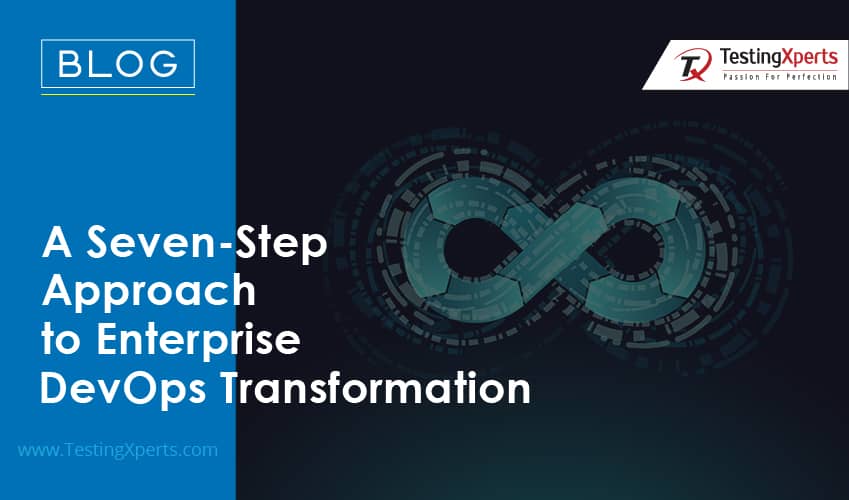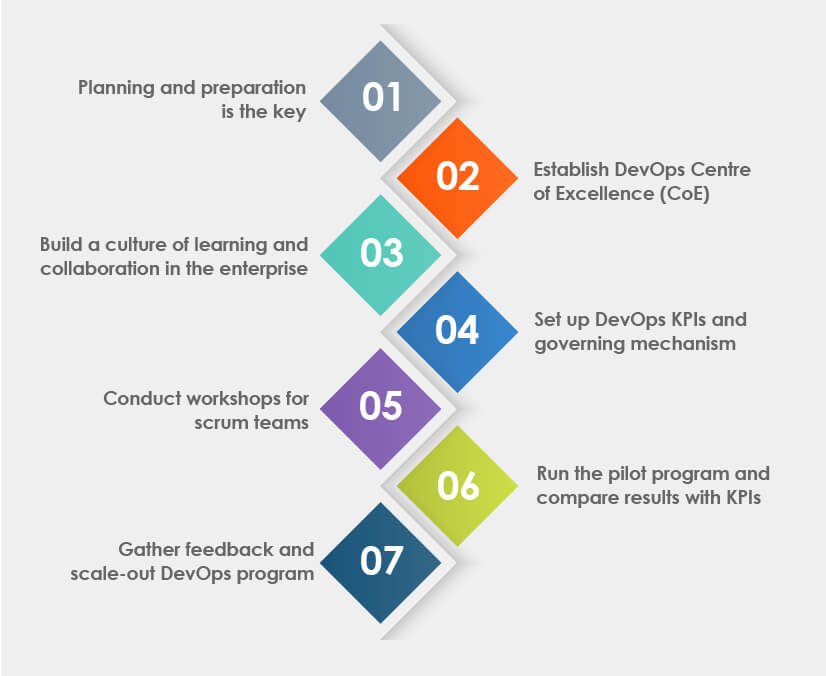Recommended Blogs
A Seven-Step Approach to Enterprise DevOps Transformation

Today, businesses must adopt changes and implement them to survive and grow in a highly volatile market at the earliest in their organisations. Interestingly, small-scale companies or start-ups in the United Kingdom can easily adapt to these changes, while large-scale enterprises may face difficulties in adapting and implementing these changes.But, it is inevitable for businesses of all sizes to adapt to the new trends of digital transformation and DevOps methodologies to beat the competition.
To achieve a seamless DevOps transformation in their enterprise and gain significant results, businesses in the UK should follow specific steps. Even before highlighting the DevOps transformation steps, let us understand about DevOps methodology.
What is DevOps Transformation?
DevOps is an evolution from agile methodology and is an enterprise transformation approach. It aims to break traditional silos that earlier existed between cross-functional teams. This methodology brings the developer teams, operation teams, QA teams together. It puts individuals, processes, and products together to help organisations release high-quality software faster than the earlier traditional approaches. DevOps transformation is said to play a key role in achieving successful digital transformation for today’s enterprises.
What does enterprise DevOps Transformation mean?
Enterprise DevOps transformation is a process wherein enterprises reshape their organisational strategy and bring positive cultural change by implementing DevOps practices and breaking traditional silos. DevOps processes with CI, continuous testing, and continuous delivery results in improving business processes and ensures faster software delivery.
DevOps practices are combined with advanced technologies such as Artificial intelligence (AI), Machine Learning (ML), and Robotic Process Automation (RPA) to bring more agility in teams and speed up the software delivery process in the enterprises DevOps transformation journey.
Seven-Step approach for Enterprise DevOps Transformation in the UK

1. Plan strategically as a first key step
Before starting the agile and DevOps transformation process, it is essential to prepare a DevOps transformation plan. The plan should cover all aspects of the transformation journey and guide teams to move ahead in the transformation process.
At this stage, it is essential to ensure that the goals and objectives of the transformation are communicated across the organisation; teams should be assured of management support in the challenges ahead, and transparency across teams. Securing and gaining trust from individuals is critical for the success of the DevOps transformation process as it considerably reduces the chances of resistance.
2. Establish DevOps Centre of Excellence (DCoE)
DevOps Centre of Excellence (DCoE) is a shared platform where DevOps practitioners share their experiences and learn from each other. The DevOps CoE must include representatives from all delivery teams and vendor organisations. It should be led by an enterprise leader who has support from all levels in the organisation. It is preferred to have an experienced external partner to conduct the initial phases of CoE. This DevOps transformation takes a time of 12-24 months to ensure the complete transition.
3. Build a culture of learning and collaboration in the enterprise
DevOps brings a change in the business processes, and the organisational culture is more prone to resistance from employees. This sudden change can also cause some temporary strain to some parts of the business. Still, it can effectively be addressed by building a culture of inclusion, boosting the morale of individuals & teams, and ensuring collaboration between teams. It is more likely that with agile and DevOps transformation, practitioner’s roles and responsibilities will change. Thus, teams should be provided with an ideal organisational culture and learning environment that empowers them and fosters a collaborative environment. However, businesses must note that cultural change has to happen from the top down.
4. Set up DevOps KPIs and governing mechanism
At this stage, organisation must streamline their business processes, align communication channels to achieve successful DevOps transformation. Enterprises must establish DevOps Key Performance Indicators (KPIs) to govern the culture of the enterprise.
The organisational culture typically needs effective governance, and this is where governing principles come into the picture. Governing principles or DevOps KPIs ensures safe and effective DevOps transformation. Enterprises must set the roles and responsibilities of DevOps practitioners, share awareness about team collaboration to empower teams.
5. Conduct workshops for scrum teams
This step plays a vital role in the DevOps transformation journey. It is essential to conduct workshops for the scrum teams with the help of subject matter experts (SMEs) to ensure the right sizing of tools and processes. At this stage, enterprises must look at their existing tools and technologies to identify which tools will work for the organisation, and action can be taken accordingly. Further, this step also ensures that selecting tools, accelerators, and methods is more purposeful and help teams realize the DevOps goals. As the DevOps process moves, the intake process can be altered based on the need and further evolved according to the needs and feedback from experts.
6. Run the pilot program and compare results with KPIs
At this stage, the DevOps practitioners identify the right applications and domains to apply DevOps practices. The identified portfolio should be such that it can be scaled up to the enterprise level. The right way to execute this step is to apply the pilot projects according to the domains of the development process.
Ensure that all the details needed to run an end-to-end process such as toolset, personnel, manual, and automated testing processes are all set ready. Run the pilot test and compare results with KPIs to measure the level of success.
7. Gather feedback and scale-out DevOps program
The last and final step is to gather feedback from the pilot tests’ metrics and scale them through multiple releases across different application portfolios. Since DevOps is not a one-time process, it is essential to ensure continuous feedback, optimisation, and continuous deployment throughout the DevOps transformation journey.
Conclusion
Digital transformation and DevOps have become the core elements for today’s enterprises in the United Kingdom. DevOps practices have completely reinvented the way businesses deliver the product to the customer enabling a great user experience. With the help of DevOps, enterprises can deliver high-quality products to the customer faster than ever. However, it is quite challenging for enterprises to completely transform their existing business processes and adopt DevOps.
Therefore, to ensure a successful DevOps transformation process, enterprises should build effective DevOps transformation strategy, follow step-wise DevOps transformation approaches, and lay out a proper DevOps transformation roadmap. Businesses in the UK must seek the help of DevOps transformation services providers to start their DevOps transformation journey and achieve quality results tailored for the UK market.
FAQs
Enterprise DevOps transformation is the process of integrating DevOps principles across large-scale enterprise systems. It improves collaboration, automates workflows, accelerates release cycles, and ensures software quality across departments. It also enables better agility in responding to market changes and end-user demands.
A successful DevOps transformation starts with cultural alignment, where development and operations teams collaborate seamlessly. Organizations must adopt CI/CD pipelines, automate workflows, integrate security (DevSecOps), and continuously monitor performance.
DevOps improves software delivery by enabling continuous integration, automated testing, and deployment pipelines. By reducing manual dependency, minimizing bottlenecks, and ensuring real-time feedback, DevOps helps businesses release high-quality software faster.
Enterprises often struggle with cultural resistance, legacy system integration, and toolchain complexity. Other challenges include security vulnerabilities, skill gaps, and maintaining regulatory compliance.
Automation tools streamline DevOps processes by handling repetitive tasks such as code testing, deployment, infrastructure provisioning, and monitoring. Tools like Jenkins, Kubernetes, and Terraform enhance efficiency, reduce human errors, and ensure scalability in software development.
Discover more
